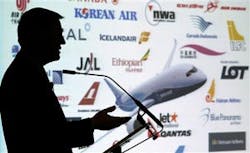Farnborough Airshow Sees Dogfights and Power Games for Aero Firms
Dogfights on the tarmac and power in the air. The business line-up for this year's Farnborough International Airshow, the aerospace industry's biannual shop window, shows little change.
There will be a barrage of orders to demonstrate the pulling power of the show, which starts today, and the big two in commercial aviation, Boeing and Airbus. Particularly of Airbus' parent, the European Aeronautic Defence and Space company (EADS), as the two manufacturers square up to each other again.
There is no shortage of issues: the management crisis at EADS, the A380 Airbus super jumbo's production headaches, the recovery at Boeing, and the unending spat over whether Boeing or Airbus benefits most from direct and indirect subsidies without breaking world trade rules.
Boeing is outstripping the Airbus order intake and starting to produce meaningful profits from its civil aircraft business. Meanwhile, the new top management team at EADS will use Farnborough as a platform to launch its recovery programme.
The launch of a revamped A350 or A370 airliner to compete with Boeing's 787 Dreamliner jet and the restart of production of the A380 will form the centrepiece of its presentation. But a deal with the Government to underpin the Airbus business in Britain once BAE Systems disposes of its 20pc shareholding will be more important for the 13,000 Airbus employees.
BAE Systems, impatient to shed its commercial history, will try to keep a low profile as it contemplates its options after being told its stake in Airbus is worth less than it thinks, and waits for the Government to sign up with Saudi Arabia for a second Al-Yamamah defence contract. The first has been worth pounds 2bn a year to BAE.
There should be an earlier boost for its order book in the shape of the Government go-ahead for 12 Nimrod maritime patrol aircraft after tortuous reviews and cost overruns.
Overhead at Farnborough, the double-deck A380 will demonstrate its star attraction status and try to impress potential passengers that it is economical and has a future.
More than 160 aircraft will either take to the air or be visible on the ground. The RAF's new Raytheon Sentinel R1 Astor surveillance aircraft will make its only public display while the Russian Aircraft Corporation's jump jet, the Mig-290VT, makes its international debut in a crowded military market that also features the Eurofighter Typhoon, Tornado, Gripen, Boeing's F-15 Strike Eagle and Lockheed Martin's F-16 Fighting Falcon.
About 1,500 exhibitors from 36 countries - a record - will be demonstrating their contribution to aerospace; and the unmanned flying sector is expanded. The International Space Pavilion will invite the young to learn about a career in space; while the citizens of Farnborough, who endure ear-splitting aerobatics every two years, are being told the air show will inject more than pounds 19m into the local economy.
The show comes against the background of a boom year for the industry. New business won by British-based aerospace companies soared 33pc to a record pounds 30.7bn while turnover rose a quarter to pounds 22.7bn. Defence sales jumped 30pc to pounds 12.2bn and civil business by 18pc to pounds 10.5bn, while the appeal of space produced a 38pc jump to pounds 603m. More figures from the Society of British Aerospace Companies, the show organisers, show how companies are keeping ahead of the game. Productivity rose by an impressive 15pc, three times more than the long-term average, at a time when another 10,000 were added to a workforce now totalling more than 124,000.
The value of an aerospace career is reflected in average earnings 31pc higher than in manufacturing overall.
Both EADS and BAE Systems are struggling to appeal. BAE's decision to exit civil aviation by selling its 20pc stake in EADS to dig itself deeper into the American defence market has produced a cold dose of reality. The valuation of ?2.75bn ( pounds 1.9bn) placed on the stake by NM Rothschild, the independent arbitrators, was 20pc below BAE's expectations and left EADS and its reluctant shareholder dismayed. Airbus has been tarnished by the six-month delay in deliveries of the A380, costly in terms of prestige and in the compensation that will now be paid to its frontline customers, Singapore Airlines and Emirates.
Top management has paid the price with the departure, under protest, of Noel Forgeard, joint EADS chief executive, and Gustav Humbert, head of Airbus. But the opportunity presented to scrap the dual chairman and chief executive roles at EADS to create a simple and single line of command, was missed because of the impasse between the two big German and French shareholders.
Meanwhile, the compensation queue will grow longer before A380 production gets back on track as Airbus ensures that the aircraft's 500 kilometres of wiring deliver all the sophisticated services promised by the salesmen.
Copyright 2005 LexisNexis, a division of Reed Elsevier Inc. All rights reserved.
Terms and Conditions | Privacy Policy
News stories provided by third parties are not edited by "Site Publication" staff. For suggestions and comments, please click the Contact link at the bottom of this page.

